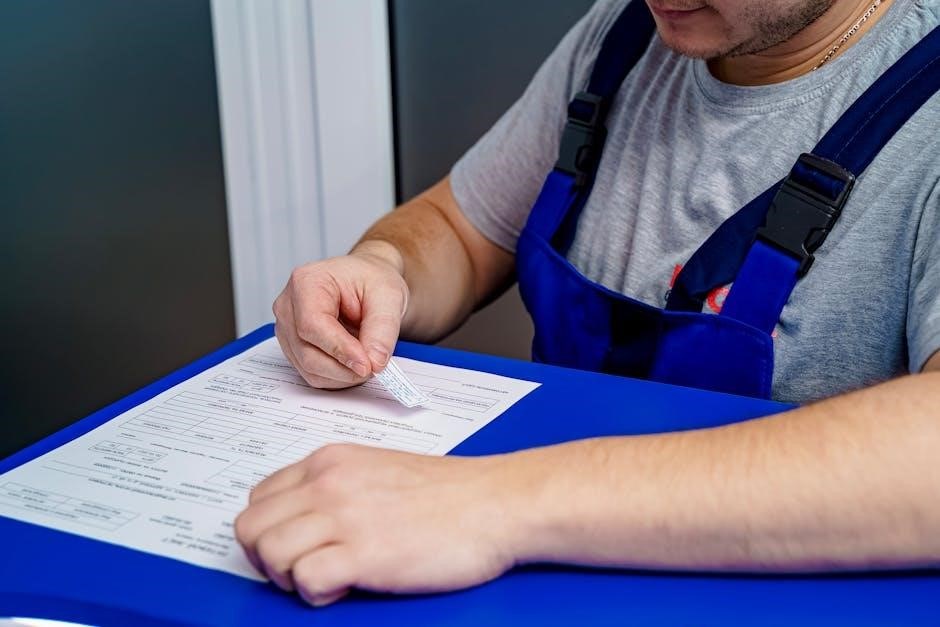The New Jersey Probate Procedures Manual is a comprehensive guide for navigating the probate process within the state.
It provides detailed instructions for executors, beneficiaries, and legal professionals to ensure compliance with New Jersey probate laws and procedures.
The manual covers key aspects such as estate administration, tax obligations, and asset distribution to facilitate a smooth probate process.
By following the manual, individuals can efficiently manage estate matters while adhering to legal requirements and avoiding common pitfalls.
It serves as an essential resource for understanding and executing the probate process effectively in New Jersey.
1.1 Overview of Probate in New Jersey
Probate in New Jersey is the legal process of validating a deceased person’s will, settling their estate, and distributing assets to beneficiaries.
It involves filing the will with the court, appointing an executor, and ensuring all debts and taxes are paid before asset distribution.
The process is governed by New Jersey state laws and is essential for ensuring the deceased’s wishes are carried out legally and fairly.
1.2 Importance of Understanding Probate Procedures
Understanding probate procedures is crucial for ensuring legal compliance, avoiding delays, and protecting the rights of all parties involved.
It helps executors fulfill their fiduciary duties, manage estate assets effectively, and distribute them according to the deceased’s wishes.
A clear understanding also minimizes disputes among beneficiaries and ensures that all tax and financial obligations are met efficiently.
This knowledge is essential for maintaining the integrity of the probate process and securing the legacy of the deceased.

Understanding the Probate Process in New Jersey
The probate process in New Jersey involves legal validation of a will, management of estate assets, payment of taxes, and distribution of property according to the deceased’s wishes or state law.
2.1 What is Probate?
Probate is the legal process of validating a deceased person’s will, settling their estate, and distributing assets according to their wishes or state law.
2.2 Why is Probate Necessary?
Probate is necessary to legally validate a will, ensuring the deceased person’s wishes are carried out and assets are distributed fairly.
It protects the rights of heirs, beneficiaries, and creditors, resolving disputes and ensuring all estate matters are handled according to law.
Probate also facilitates the payment of taxes and debts, ensuring the estate is settled properly before assets are transferred to beneficiaries.
2.3 Key Players in the Probate Process
The key players in the probate process include the executor, beneficiaries, probate court, and legal advisors.
The executor manages the estate, ensuring assets are distributed according to the will.
Beneficiaries are those entitled to receive assets, while the probate court oversees the process to ensure legality and fairness.
Legal advisors provide guidance, helping navigate complex probate laws and resolving disputes.
Legal Requirements for Probate in New Jersey
Understanding the legal requirements for probate in New Jersey is essential for ensuring compliance with state laws and procedures.
These requirements include jurisdiction, valid wills, and tax compliance to facilitate a smooth probate process.
3.1 Residency Requirements
In New Jersey, residency requirements play a crucial role in determining jurisdiction for probate matters. The deceased must have been a New Jersey resident at the time of death, or the estate must include real property located within the state. This ensures that the probate process is conducted in the appropriate county where the decedent resided or where the property is situated, adhering to state laws and procedures.
3.2 Validity of the Will
A valid will in New Jersey must be in writing, signed by the testator, and witnessed by two individuals. The testator must have legal capacity, meaning they must understand the nature of their actions and be free from undue influence. New Jersey recognizes self-proven wills, which streamline probate by including affidavits from the testator and witnesses. Handwritten wills may be valid if proven to be in the testator’s handwriting and reflect their intent.
3.3 Death Taxes and Estate Tax Implications
New Jersey imposes state estate taxes on estates exceeding a certain threshold, with rates varying based on the estate’s value. Executors must file estate tax returns and pay taxes before distributing assets. The state also considers federal estate tax implications, ensuring compliance with both state and federal regulations. Proper planning and filing are crucial to avoid penalties and ensure smooth estate administration.
Filing the Probate Petition
Filing the probate petition involves submitting the necessary legal documents to the appropriate New Jersey probate court to initiate the estate administration process officially.
4.1 Necessary Documents for Filing
To initiate probate, essential documents include the original will, death certificate, and a completed probate petition.
Additional requirements may involve an inventory of estate assets, Letters Testamentary, and other legal paperwork as specified by New Jersey probate laws.
4;2 Where to File the Petition
In New Jersey, probate petitions must be filed with the Surrogate’s Court in the county where the deceased resided.
Filing in the correct county ensures jurisdictional accuracy and proper handling of the estate.
Consult the court clerk for specific filing procedures and requirements to avoid delays.
4.3 Filing Fees and Costs
Filing fees for probate petitions in New Jersey vary based on the estate’s value and complexity.
Costs typically include a filing fee, publication fees, and potential attorney expenses.
Payment methods accepted by the Surrogate’s Court are usually cash, checks, or credit cards.
Ensure accurate fee payment to avoid delays in the probate process.
Consult the court clerk or legal advisor for specific cost details and requirements.
Notifying Interested Parties
Notifying beneficiaries, heirs, and creditors is crucial for transparency and legal compliance in New Jersey probate proceedings.
Legal notices must be published and served to ensure all parties are informed of the probate process and their rights.
Timely notification helps prevent disputes and ensures smooth estate administration.
5.1 Beneficiaries and Heirs
Beneficiaries and heirs are individuals entitled to receive assets from the estate under the terms of the will or New Jersey intestacy laws.
They must be notified promptly to ensure transparency and allow them to assert their rights during the probate process.
The executor is responsible for identifying and informing all beneficiaries and heirs through legal notices or direct communication.
Failure to notify them properly can lead to delays or disputes in the probate proceedings.
Ensuring beneficiaries and heirs are informed is a critical step in maintaining fairness and compliance with probate regulations.
5.2 Creditors and Other Stakeholders
Creditors and other stakeholders, such as banks or service providers, must be notified to settle debts from the estate.
The executor is responsible for identifying and informing all creditors through legal notices or direct communication.
Creditors typically have a specific timeframe to file claims against the estate.
Failure to notify creditors properly can result in unresolved debts or legal disputes.
Ensuring creditors are informed is essential for a smooth probate process and fair distribution of assets.
5.3 Legal Notice Requirements
Legal notices are essential to inform all parties of the probate process and ensure transparency.
In New Jersey, notices must be published in a local newspaper and served to known creditors and stakeholders.
The notice typically includes the decedent’s name, estate details, and deadlines for filing claims.
Properly serving legal notices ensures compliance with state laws and avoids potential disputes.
Failure to meet notice requirements can delay the probate process or lead to legal challenges.
Executors must maintain records of all notices served for court verification.

Handling the Estate Assets
Handling estate assets involves identifying, managing, and protecting the decedent’s property to ensure proper distribution according to the will and legal requirements.
6.1 Inventory of Estate Assets
The inventory of estate assets is a critical step in the probate process, requiring a detailed list of all property owned by the decedent at the time of death. This includes real estate, bank accounts, investments, personal property, and any other valuables. The executor or personal representative must accurately identify, document, and value each asset to ensure compliance with legal requirements. Accurate valuation is essential for tax purposes and proper distribution. The inventory must be submitted to the court, along with supporting documentation, to confirm the estate’s total worth. Failure to complete this step thoroughly can lead to legal complications or delays in the probate process. Properly documenting and valuing assets ensures fairness and transparency for all beneficiaries.
6.2 Managing and Protecting Assets
Managing and protecting estate assets is a fiduciary duty of the executor or personal representative. This includes securing physical assets to prevent theft or damage, maintaining property, and managing financial assets such as investments and bank accounts. Proper insurance coverage should be verified, and any necessary steps taken to preserve the value of the estate. Legal and financial advice may be sought to ensure assets are handled appropriately and ethically.
6.3 Distributing Assets According to the Will
The distribution of assets according to the will is the final step in probate; The executor must adhere strictly to the deceased’s instructions. Beneficiaries are notified, and assets are distributed as specified. Creditors are paid from the estate before any inheritance. Legal requirements must be followed to ensure a smooth transfer of property. This ensures the deceased’s wishes are honored.

Caring for Dependents and Minor Children
The probate process ensures the well-being of dependents and minor children by establishing legal guardianship and managing financial provisions to protect their interests during estate administration.
7.1 Guardianship and Conservatorship
Guardianship and conservatorship are legal arrangements to manage the care and finances of minors or incapacitated individuals during probate.
The court appoints a guardian to oversee personal well-being and a conservator to handle financial matters, ensuring the dependent’s best interests are protected throughout the estate administration process.
These roles are crucial for safeguarding the rights and welfare of vulnerable dependents until they can independently manage their affairs.
7.2 Providing for Dependents
Providing for dependents is a critical aspect of probate, ensuring their financial and emotional needs are met during estate administration.
The probate process includes setting aside funds for dependent support, such as minor children or incapacitated adults.
Proper documentation and legal processes ensure dependents receive necessary resources while the estate is settled.
Executors or guardians must manage these provisions carefully, adhering to New Jersey probate laws and court oversight to ensure fairness and compliance.
This step is essential for maintaining the well-being of dependents throughout the probate process.
7.3 Special Considerations for Minors
Minors require special attention in probate to ensure their inheritance is managed appropriately until they reach legal age.
A guardianship may be established to oversee their assets, ensuring funds are used solely for their benefit and well-being.
Courts often require trusts to protect minors’ inheritances, preventing misuse of assets until they can manage them independently.
Additional protections, such as court oversight, are in place to safeguard minors’ interests during the probate process.
Proper planning and legal guidance are essential to address the unique needs of minor beneficiaries effectively.
Taxes and Financial Obligations
Understanding estate taxes, income taxes on estate earnings, and paying creditor claims are critical steps in managing the financial aspects of probate in New Jersey.
8.1 Estate Taxes in New Jersey
New Jersey’s estate tax applies to estates exceeding the state’s exemption level, which aligns with the federal exemption limit of $12.92 million for 2025.
Estates exceeding this amount must file a federal estate tax return and a New Jersey estate tax return, ensuring compliance with both state and federal regulations.
The state-specific deductions and exemptions, such as charitable bequests and certain property exemptions, can reduce the taxable estate value.
Executors must carefully calculate and file taxes within nine months of the decedent’s death to avoid penalties and interest.
Consulting a tax professional is recommended to navigate the complexities and ensure accurate filing.
8.2 Income Taxes on Estate Earnings
In New Jersey, income taxes on estate earnings apply to income generated by the estate after the decedent’s death.
The executor or administrator must file a fiduciary income tax return (Form 1041) for the estate if its annual income exceeds the IRS threshold.
The filing deadline is April 15th of the year following the decedent’s death, with a six-month extension available.
Deductible expenses include administrative costs, taxes, and charitable contributions, reducing taxable income.
Beneficiaries may owe taxes on distributions received from the estate, depending on the nature of the income.
Accurate record-keeping is essential to ensure compliance with state and federal tax regulations.
8.3 Paying Creditor Claims
The executor must notify creditors and pay valid claims from the estate’s assets following New Jersey law.
Creditors typically have a specific timeframe to file claims, after which they may be barred from seeking payment.
Claims are prioritized, with administrative expenses, funeral costs, and taxes paid first, followed by other debts.
If the estate lacks sufficient funds, creditors may receive partial payments or none, depending on the estate’s financial situation.
The executor must ensure fair distribution to avoid legal disputes and fulfill their fiduciary duty.

Disputes and Contested Matters
This chapter addresses common issues arising during probate, such as will contests or beneficiary disagreements, and outlines the legal processes for resolving disputes through mediation or litigation, emphasizing the court’s role in ensuring fair outcomes and the importance of legal representation to navigate complex situations effectively.
9.1 Handling Contested Wills
Contested wills in New Jersey often arise from claims of undue influence or lack of testamentary capacity. The probate court reviews such cases to determine the will’s validity. Beneficiaries or heirs may challenge the will, requiring the executor to defend its authenticity. Legal representation is crucial to navigate this complex process, ensuring all parties’ interests are protected and the court’s decisions are fair and binding.
9.2 Resolving Disputes Among Beneficiaries
Disputes among beneficiaries in New Jersey probate cases often arise from conflicting interpretations of the will or dissatisfaction with distributions. Mediation is commonly used to resolve such issues amicably. If mediation fails, the court may intervene to ensure fair distribution. The executor plays a crucial role in facilitating resolutions and maintaining open communication among all parties involved.
9.3 Mediation and Litigation Options
Mediation offers a cost-effective alternative to litigation, allowing beneficiaries to resolve disputes amicably with the help of a neutral third party. Litigation, while more formal, ensures court oversight for complex issues. Both options aim to protect the estate’s integrity and uphold the deceased’s intentions. Executors often play a key role in facilitating these processes to maintain harmony among beneficiaries.
Distribution and Closing the Estate
The final distribution of assets occurs after debts and taxes are paid, following the will’s instructions. The probate case is legally closed, and the executor’s duties conclude.
10.1 Final Distribution of Assets
The final distribution of assets occurs after all debts, taxes, and expenses are paid. The executor allocates the remaining assets to beneficiaries according to the will or state law. Beneficiaries receive their shares, and the executor ensures all legal requirements are met. Proper documentation is maintained for transparency and accountability, marking the conclusion of the estate administration process in New Jersey probate.
